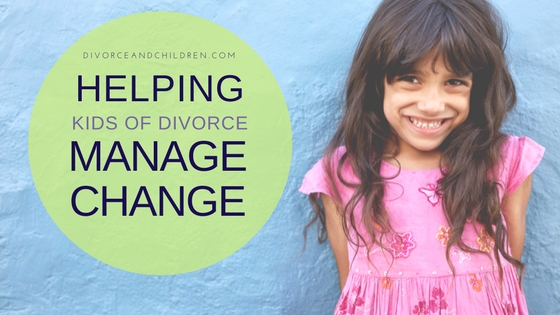Helping Kids of Divorce Manage Change
Nine months ago, Mathew’s parents told him that they were separating. They said while they were figuring things out they would keep living in the same house. Yesterday Mathew’s mom, Jackie, announced she’s moving out tomorrow. Mathew felt like somebody just punched him in the stomach. He thought his parents were trying to work things out.
Mathew said he wants to go with her, he’s really worried about where she’s going to live. Mom said he can see the new place after she gets moved in.
Mathew isn’t the only one feeling gutted. Mathew’s dad, Blake, is devastated too. He told Mathew, “I don’t know why she’s leaving us.” Mathew has never seen his dad cry before. He’s really scared but doesn’t want to say anything to Mom or Dad. No point in making things worse.
Divorce undoubtedly creates a tremendous amount of change in children’s lives. When kids find out that you’re splitting up, how you’re handling those changes makes a big impression. While you don’t need to hide how you feel, be sure you’re dealing with your feelings in a way that doesn’t leave your kids wondering if you’re going to be okay.
Like your kids, you may also be worried about making things worse and decide to keep quiet. However, when you don’t talk about divorce, children assume talking about it isn’t okay. Don’t leave your kids in the dark. Even if you feel guilty or don’t know what to say, find some way to talk to your children about how life is changing. Kids need to understand what’s happening in the family. You can also ease your children’s fears of the unknown by having ongoing conversations verses one BIG talk.
Of course, divorce isn’t the only change your children will face. As life unfolds there will likely be many changes that kids will need to manage like, a parent dating, remarriage, moving, financial adjustments, a parent going back to work or birth of new children etc.
You can prepare kids for big changes or new situations by:
· Thinking through what you want to say before talking with children.
· Focusing on your children’s feelings.
· Addressing issues that will be most important to them.
· Talking about how things will be different and what will stay the same.
· Giving them time to adjust before changes happens.
If children have questions you’re not ready or able to answer, let them know that you don’t have everything figured out yet. When you have an answer, they’ll be the first to know.
Keeping kids informed however, doesn’t mean sharing every detail.
Children still need to be shielded from adult information such as intimate details about problems in the marriage, child support, legal matters, issues parents have with one another and information about finances.
To help your kids manage change, consider the following:
Manage your feelings.If you’re having a tough time handling the divorce, some big change in your situation or have strong feelings about the other parent, be sure to deal with your feelings before talking to your children. You may think you’re putting up a good front, but kids notice more than we think.
Be sure you have support for yourself so you can be the parent your kids need you to be. Consider talking to a trusted friend, seeking out a counselor or life coach, joining a support group or reading a book on divorce.
Build on past experiences.
When preparing your kids for a new situation, like a parent moving out of the family home, think about how you have helped your children handle other changes in the past.
For example, if your kids were transferring to a new school, how would you get them ready for that change? What would you do to prepare them for their first day?
How could you take a similar approach to some of the changes your kids are going through now? What might make the transition easier.
For example, if a parent is moving out of the family home, you might plan to talk with the kids two weeks before the move is happening. Talk with them about where the new place will be, maybe take them by to see it before the move in. Look around the neighborhood to get familiar with what’s nearby. Chat with them about what might make it more comfortable with them.
Don’t change everything at once.
When life is changing, do what you can to keep some things the same for kids.
You can:
• Help children stay in touch with close friends.
• Make sure kids still see people who are important to them(i.e. grandparents or relatives on both sides of their family.)
• If possible, keep them in same school or neighborhood.
• Allow them to stay involved in activities or groups that they enjoyed before the divorce(i.e. playing sports, being in band, choir or school plays, church youth groups, Boy Scouts,
Girls Scouts or other organized clubs.)
Give your children time to adjust.
In the beginning stages: Even when children know there are problems, hearing the news you’ve decided to divorce leaves most kids feeling shocked. Give your children time to adjust to the divorce before you make other big changes like moving to a new neighborhood, introducing them to your new love interest or schedule changes.
Down the road: As life unfolds there will be lots of other transitions and changes that you and your kids will go through. As changes come up, do your best to give your children the time and emotional space they need to adjust.
Keep in mind, just because you’re good with it doesn’t mean they will be. Sometimes kids may act like everything is okay or not talk about how upset they feel because they don’t want to rock the boat. To get a good read on how they are handling things, consider checking in with them from time to time to keep the lines of communication open.
What were the hardest changes your kids faced after your divorce? How did you help them ?
Got some tips to shorten the learning curve for other parents? Post in the comments section below, I’d love to hear from you.
Until next time,
Christina






